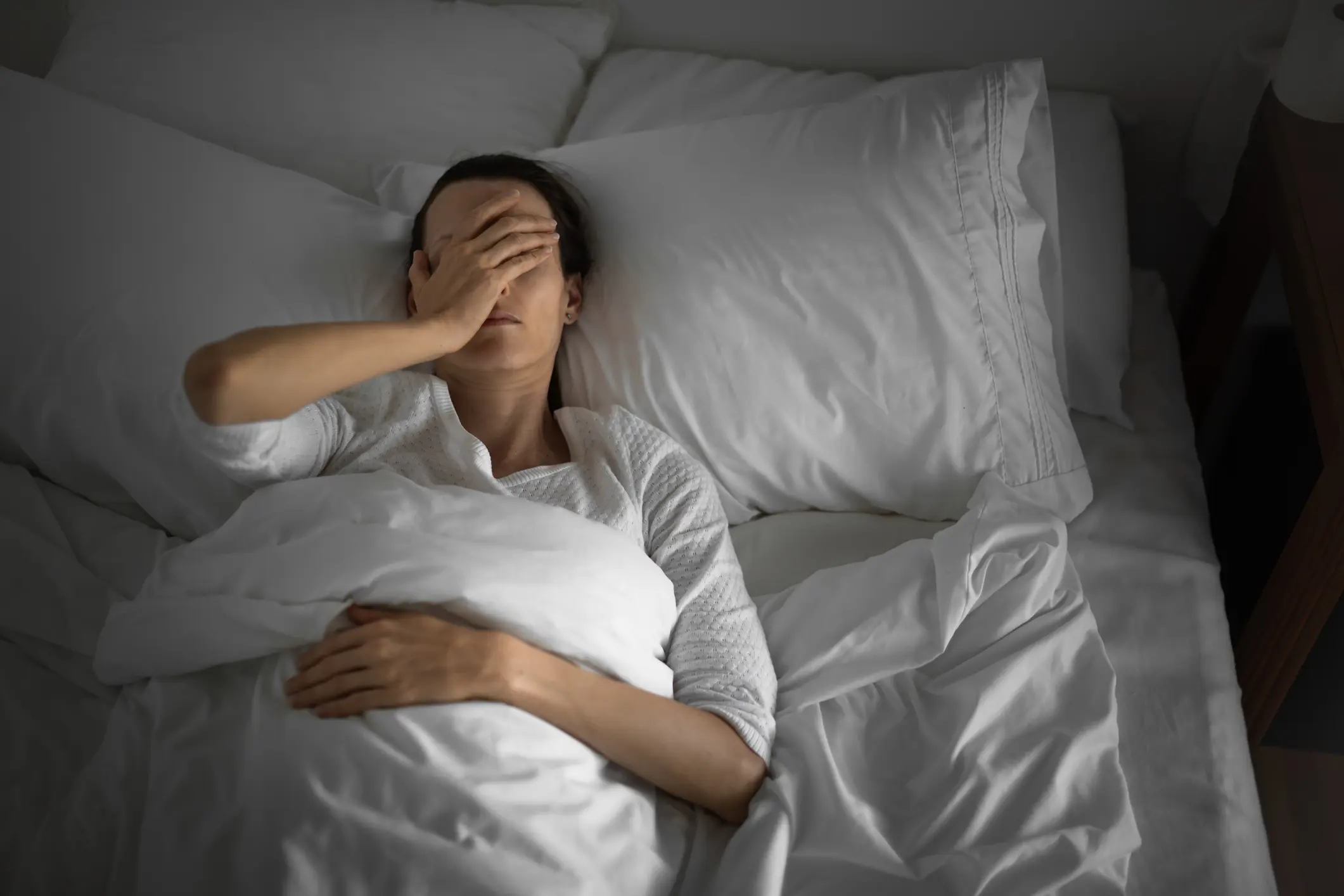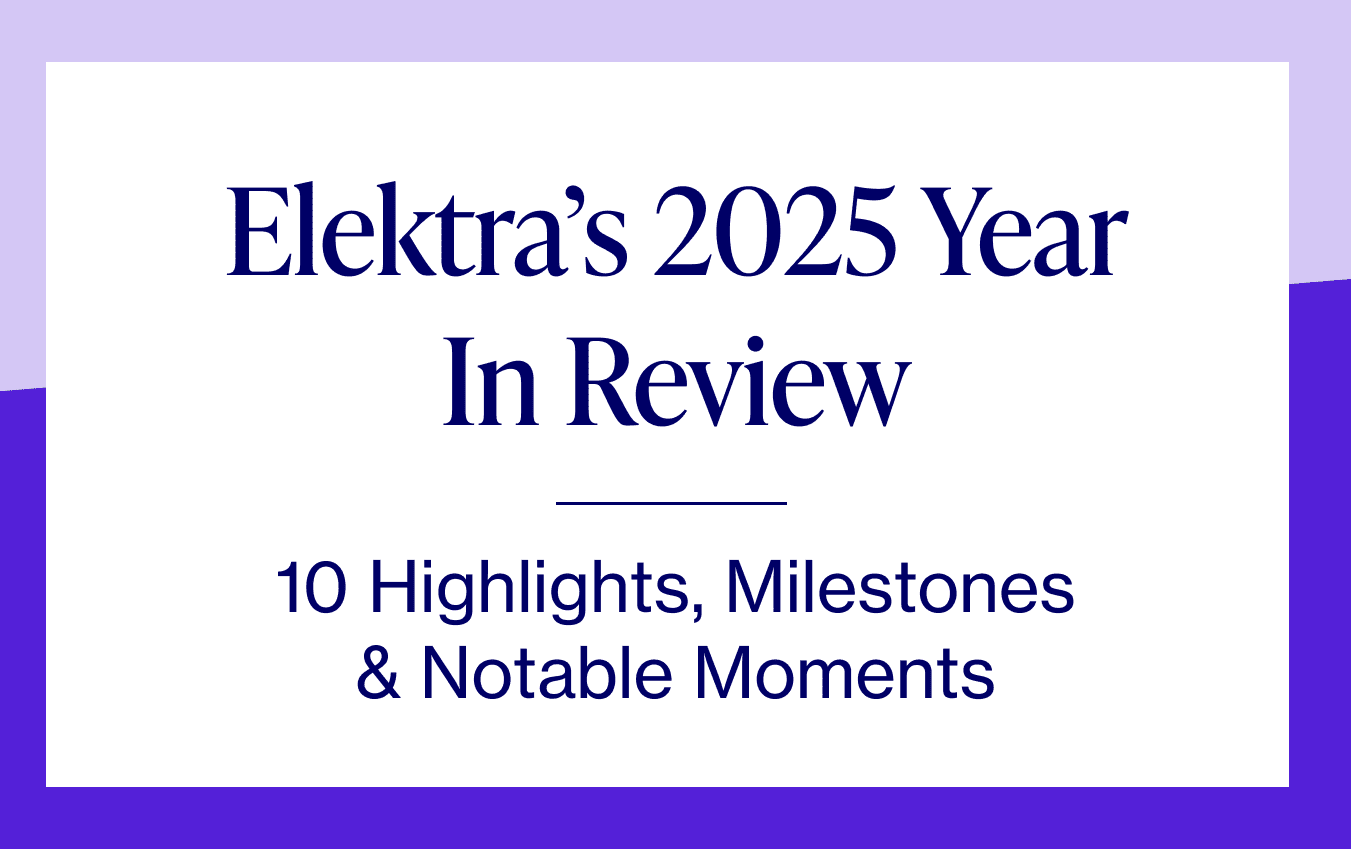
Published on Jun 23, 2025
Last modified on Dec 22, 2025
Menopausal Insomnia Keeping You Up? CBT-I Can Help.
6 min read
Sleep problems, including difficulty falling asleep and staying asleep, waking up too early, and suffering from sleep apnea are unwelcome but common symptoms of menopause. According to the National Sleep Foundation, up to 46% perimenopausal women experience sleep difficulties, and as many as 50% of postmenopausal women experience sleep disorders.
Why? Well, namely we’re dealing with reproductive hormone fluctuations associated with the menopausal transition. Estrogen, progesterone, serotonin, and melatonin, all of which play a role in regulating sleep, are in decline. At the same time, cortisol (aka the stress hormone) is increasing. Consider this, and the prevalence of potential life stressors at this time like raising children, caring for aging parents, or career milestones. What we get is the perfect storm for disruptions to our sleep patterns and quality.
The good news is, better sleep isn’t off the menu. We sat down with Dr. Parky Lau, a sleep expert at Stanford Medical School and Moona provider, to learn about how cognitive behavioral therapy for insomnia (CBT-I) can help.
What is CBT-I?
CBT-I is widely considered the gold standard treatment for chronic insomnia, and it works by targeting unhelpful thoughts and behaviors that can create sleep disturbances.
The program includes various evidence-informed strategies, such as:
1. Sleep consolidation: This method attempts to match time spent in bed with time spent actually sleeping. This trains the body to fall asleep faster and stay asleep longer, boosting overall sleep efficiency.
2. Relaxation exercises: Practicing deep breathing or muscle relaxation before bedtime calms the nervous system, easing physical and mental tension to promote falling asleep and reduce nighttime awakenings.
3. Stimulus control: Helps patients associate the bed strictly with sleep (and sex). Encourages leaving the bed if unable to sleep and maintaining a consistent wake-up time, strengthening the link between the bedroom and restful sleep.
Unlike prescription sleep aids and supplements, which provide short-term relief from symptoms of insomnia, CBT-I works to address the underlying causes of sleep difficulties, which makes it an effective long-term solution. It’s also worth noting that insomnia can also come in phases, and CBT-I helps patients establish a tool box of sleep hygiene techniques they can pull from when struggling with poor sleep, even when they’re no longer in treatment.
What’s this have to do with menopause?
As we know, fluctuating hormone levels in menopause can result in sleep disturbances –– making it difficult to fall, and stay asleep. That’s where CBT-I comes in. First, CBT-I leverages the principles of sleep regulation to improve the overall quality of sleep. This improved sleep can create a protective effect against sleep disruptions resulting from vasomotor symptoms (hot flashes and night sweats).
While hot flashes/hot flushes might be the culprit behind our initial middle-of-the-night waking, anxious thoughts that follow can keep us awake. The anxiety of losing sleep alone can cost us more sleep! This cycle can be addressed through CBT-I techniques which help reduce this “secondary arousal” and address the factors that keep us awake.
CBT-I and Mood
Sleep is deeply connected with other aspects of our health, especially in menopause. When we’re not sleeping well, we can feel those downstream effects. CBT-I has demonstrated improvements in mood, anxiety, chronic pain, and symptoms of posttraumatic stress.
READ MORE: Menopause Symptom Deep Dive: Navigating Mood Changes in Midlife
When to seek help and what to expect
When is it time to see a healthcare professional?
Many people experience difficulty sleeping at one point or another due to life stressors, so knowing when to seek help can feel tricky. Here’s what clinicians are usually looking for to make a diagnosis of insomnia:
- Difficulty falling asleep, staying asleep, and/or waking too early three or more days a week for a period of three or more months.
- Experience of daytime sleepiness, concentration difficulties, and mental health or mood disruptions.
When left untreated, chronic insomnia can increase our risk of other health conditions like high blood pressure, excessive weight gain or obesity, and anxiety, so it’s important to seek help sooner rather than later.
RELATED: Are Antidepressants Lowering My Libido During Menopause? (Lexapro, Prozac, Zoloft…)
What type of health care provider should someone seek for CBT-I?
When looking for a sleep medicine practitioner, we recommend looking for a clinician trained specifically in the delivery of CBT-I, with a strong understanding of the science of sleep regulation. The clinicians at Moona Health are trained in CBT-I and developed expertise in delivering tailored care to specific populations, such as pregnancy, postpartum, and menopause.
What should someone expect from a session with a CBT-I provider?
An initial CBT-I session will begin by exploring a patient’s experience with their sleep difficulties and collaboratively setting treatment goals. The clinician will help the patient understand the basic principles of sleep regulation and why they may be experiencing chronic sleep disturbances. Using data from the patient’s sleep diary, the clinician will provide tailored recommendations to address the causes of insomnia and promote long-term sleep health.
Following sessions will focus on helping the patient implement behavioral and cognitive exercises and lifestyle changes to support their sleep goals. This could look like limiting naps, or setting limits around screen time in bed. The goal is to help patients sleep better and to improve their self-confidence about sleep, which can completely inform quality of sleep.
How many sessions are required for someone to notice a difference in their sleep quality?
Sleep is highly individualized, as are treatment needs; patients and clinicians will work together until patients feel that they’ve met their sleep goals. However, research suggests that sleep quality can improve even after a single session and that nearly two-thirds of patients benefit significantly after four sessions.
Can hormone menopausal hormone therapy help?
Improved sleep may be both a direct and indirect benefit of menopausal hormone therapy (previously referred to as hormone replacement therapy or HRT) due to its effect on estrogen and progesterone as well as night sweats. However, MHT is not the first line of treatment for insomnia alone. If insomnia is your primary issue, we recommend seeing a sleep specialist.
The bottom line
Trouble sleeping is one of the most common symptoms of menopause, and can have a real impact on our overall well-being and quality of life. But, a good night’s sleep is possible. CBT for insomnia is a proven treatment for sleep issues related to hormonal changes.
READ MORE:


